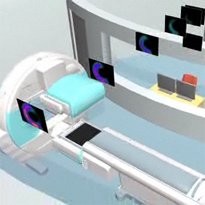Siemens Healthcare has identified the Pilgrim Hospital in Boston, Lincolnshire, as the first European customer for its Symbia.net clinical workflow server.
The company says the hospital, which is part of United Lincolnshire Hospitals NHS Trust, has been using the thin-client application for the remote processing and reporting of nuclear medicine images and data since last May.
The hospital operates from a ten-storey block, in which the nuclear medicine clinic rooms and reporting rooms are on different floors.
The Symbia.net installation has improved efficiency at the hospital by allowing staff to monitor and review scans without having to make phone calls or move between floors to chase progress.
“We are now able to view and process clinical data on designated office PCs,” said Dr Philip Cosgriff, consultant physicist at the trust in a statement.
“With the ability to conduct all routine image viewing and processing tasks remotely, we have smoothed our workflow at the same time as improving staff efficiency.
“We are looking at how we can evolve the floating licences further, enabling further expansion as demand increases. For example, we are looking at the ability to connect to Symbia.net through a home PC to enable out of hours reporting.”
Symbia.net gives nuclear medicine staff access to the processing and reading capabilities of SPECT and SPECT.CT studies from a standard networked PC with the client software installed.
At Pilgrim Hospital, images from a Siemens Healthcare c.cam cardiac gamma camera and a Symbia S SPECT system are sent automatically to the Symbia.net server, where they can be processed locally or remotely.
Siemens argues that the licence-based application is cost efficient and flexible enough to allow for expansion and change.
“As the needs of the department grow, it is an economical system to maintain and expand and requires less capital investment than two standalone workstations,” said Lawrence Foulsham, molecular imaging and oncology product manager at Siemens Healthcare.
“The Pilgrim Hospital has not only streamlined its workflow by providing hospital staff with easy, economical access to all patient cases and applications, but has also allowed it to leverage its existing hardware and IT software.”

